by Naomi L. | September 27, 2017 | Blog, Creative Writing |
Writers need a lot of support to make it through their careers. For many of us just starting out, the bulk of that support comes from family, and of all the relatives who motivate you, few do it better than your mom. Given that she’ll always love you no matter what, you know she’s been there for you since the beginning of your life, and she’ll always be there for you to the end!
This week marks a special occasion for that amazing woman in my life, so today I want to honor her with a creative writing post highlighting all the awesome ways she’s supported my dream to be a writer. For your consideration, here are ten signs your mom is the biggest supporter of your writing career. Thanks for all your support, Mom!
 1) She gave you the book that made you want to become a writer in the first place – In my case, that was Charlie and the Chocolate Factory, a book my mom had read as a child and recommended to me when I was nine years old. It changed my life!
1) She gave you the book that made you want to become a writer in the first place – In my case, that was Charlie and the Chocolate Factory, a book my mom had read as a child and recommended to me when I was nine years old. It changed my life!
2) She’s bought you dozens of books throughout your life – From a Roald Dahl collection to the Harry Potter series to The Mists of Avalon, much of my writing has been inspired by books my mom gave me when I was growing up. If your mom gave you plenty of books when you were a kid, you’ll likely find traces of those in your writing too!
3) She didn’t laugh when you told her you wanted to grow up to be an author – If anything, she encouraged your dream and promised to read every single one of your books (which of course you promised to give her free copies of). Bonus points if she bought you the books and/or courses on writing that helped you get there.
4) She brags to everyone she knows that her daughter/son is a writer – Maybe this embarrasses you a little, since most writers prefer to keep to themselves, but hey, free marketing is always a plus!
5) She’s always the first to read your stories – And she loves every single one. Seriously, you could probably write the goriest thriller ever and your mom would still tell you she enjoyed it (though it might be safe to assume she at least skipped over some parts).
6) She’s always the first to review your books – And it’s always five stars across the board. You couldn’t ask for a more devoted fan!
7) She thinks everything you write is amazing – Your mom can never find a single flaw even in the first drafts of your work. This makes her a terrible beta reader but an excellent motivator!
8) She insists that you’re a better writer than most famous authors – And even though you know it’s not true, you appreciate that she’ll always be your biggest fan.
9) She encourages you to keep writing even when you want to give up – She didn’t invest all that time and energy supporting you just to watch you quit on your dreams. Now get back to writing that future bestseller!
10) No matter how successful you really are, you’ll always be a bestselling author in her eyes! – And could you really ask for greater support than that?
Is your mother your biggest fan? How many of these signs fit her? What other signs would you add to this list?
Today’s post is dedicated to my mother, whose love and support have always kept me going on my writing journey. Happy Birthday, Mom! I love you!
by Naomi L. | September 20, 2017 | Blog, Creative Writing, Off The Bookshelf |
Last year, I reached my first-ever Goodreads Reading Challenge goal of ten books, most of which were historical fiction. I’ve already covered Pride and Prejudice and Sense and Sensibility by Jane Austen in my Off the Bookshelf segment, so today I’m switching over to another author whose novel I really enjoyed: The Picture of Dorian Gray, by Oscar Wilde!
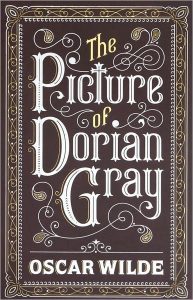
The Picture of Dorian Gray, by Oscar Wilde
Summary
The Picture of Dorian Gray is the only novel written by Irish poet and playwright Oscar Wilde. First published in Lippincott’s Monthly Magazine in July 1890, the novel exists in three versions: the censored 13-chapter edition published in the magazine in 1890, the revised 20-chapter book edition published in 1891, and the uncensored 13-chapter edition submitted to the magazine with all of Wilde’s original material intact. The story follows the moral corruption and downfall of Dorian Gray, a handsome yet narcissistic young man whose vanity leads him to wish that a painting of himself will age in his stead. After his wish comes true, Dorian succumbs to a hedonistic lifestyle of vice and sin from which his insatiable desire for pleasure leaves him little chance to escape.
Review
If it were only the other way! If it were I who was to be always young, and the picture that was to grow old! For that—for that—I would give everything! Yes, there is nothing in the whole world I would not give! I would give my soul for that! – Dorian Gray
A brief disclaimer: Because Wilde’s novel exists in three different forms, each one differs slightly from the others, in some cases affecting the plot. The version I read is the 1891 20-chapter book, so this is the edition that will be referenced throughout this review.
The Picture of Dorian Gray has often been compared to the Faust story, in which a dissatisfied scholar sells his soul to the Devil for unlimited knowledge and pleasure. Similarly, in a moment of weakness and newfound vanity, Dorian offers up his soul for the chance to remain young and handsome forever. In response to this wish, the painting becomes a mirror of Dorian’s soul and begins reflecting the effects of his actions that his body will now be spared. This inciting incident plays into the themes of valuing youth and beauty above all else and the consequences of choosing pleasure over virtue.
One of the most prominent themes in the book is the conflict between morality and pleasure. Although Dorian initially struggles with his new philosophy, his selfish desires ultimately overpower his guilt: after his romance with the young actress Sibyl Vane ends tragically, the subtle change in his portrait’s face proves his actions will have no visible consequence, as the painting will bear all the marks of his sins for him. After accepting Sibyl’s death as an artistic personification of tragedy, Dorian is free to pursue pleasure without risk and spends the next several years of his life indulging in various forms of gratification. Only in the final chapters of the story does he come to question if perpetual youth was worth the price of his soul.
Indeed, the fact that his artistic lifestyle costs him his soul is what makes Dorian Gray such an enigmatic character. Having given up his emotional depth, the protagonist’s true personality remains a mystery to the reader throughout the story. One detail of the novel that makes this evident is the heavy color motif. So many descriptions in the novel involve color in some way, and while at first I dismissed these vivid descriptions as the flowery writing of a poet, I later recognized their allusion to the main character’s internal conflict. The paradox of The Picture of Dorian Gray is that by giving up his soul for the pursuit of pleasure and the perpetuation of beauty, Dorian is no longer able to appreciate either—that is, in a world full of color and beauty, Dorian’s soulless existence is perpetually gray. Thus, Wilde’s novel—at least the revised version—supports the idea that art alone cannot bring happiness; one must have emotional depth in order to appreciate it.

From left to right: Lord Henry Wotton, Dorian Gray, Basil Hallward (Dorian Gray, 2009)
Aside from Dorian, the story features two other important characters: Basil Hallward, the painter of the infamous picture, and Lord Henry Wotton, a witty aristocrat who advocates “New Hedonism”. Both are equally fascinated by Dorian’s beauty but stand at opposite ends of his moral spectrum: Basil represents conformity to moral standards while Lord Henry represents the temptation of sin. In this way, these two gentlemen play the roles of Dorian’s “shoulder angel and devil”, respectively, and personify the novel’s overarching conflict between virtue and hedonism: Basil sees only beauty in Dorian and encourages him to remain virtuous, while Lord Henry lauds his youth and persuades him to live for pleasure above all else. And although Dorian never escapes from the guilt the painter evokes in him, the fact that the story plays out far worse for Basil than for Lord Henry further supports the novel’s theme of beauty’s superiority over virtue.
Interestingly, The Picture of Dorian Gray presents an unusual example of an unscrupulous protagonist who repeatedly dodges moral justice. While Dorian influences several people to unfortunate ends throughout his life, he himself doesn’t get what he deserves for almost the entirety of the novel. While this may be an allusion to Wilde’s aesthetic beliefs, it’s more frequently interpreted as a comment on society’s superficiality and hypocrisy; although several rumors emerge about Dorian’s immoral exploits over the years, his peers nonetheless continue to accept him because he’s beautiful and, by all appearances, innocent. Yet as with any Faustian story, sin is ultimately punished in the end, thus completing the theme of eternal pleasure coming at an exceedingly high cost.
The Picture of Dorian Gray is an intriguing novel, a mix of Gothic horror with social and artistic commentary that never seems to settle on a single form. Even the moral of the story is not so black and white as its similarity to the Faust fable would suggest, as the main character doesn’t suffer the consequences of his actions until the very end, and even then justice is brought about by his own hands. Yet by all accounts, with its enigmatic themes, poetic motifs, and structure of an unusual moral fable, Wilde has created nothing less than an outstanding and fascinating work of art.
Inspiration
There is no such thing as a moral or an immoral book. Books are well written, or badly written. That is all. – Oscar Wilde
In a strange meta twist, the most fascinating aspect of The Picture of Dorian Gray may actually be the author’s preface in the book edition. When Oscar Wilde first submitted his manuscript for publication, the editor of Lippincott’s Monthly Magazine censored the story, removing roughly 500 words without the author’s knowledge. Nevertheless, the novel was widely decried as a violation of public morality. A year later, upon publishing the revised book version, Wilde issued a preface to address these criticisms and defend his work, claiming in this artistic manifesto that the only point of art is to be beautiful, not to serve a moral purpose.
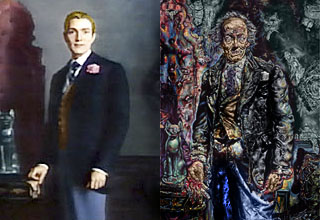
Dorian’s painting, before and after
(Image source: TV Tropes)
Yet in The Picture of Dorian Gray, the eponymous painting itself serves a moral purpose by shedding light on the high price of vanity. Despite the author’s advocacy of aestheticism, his novel suggests that art always contains some degree of meaning: though Dorian constantly tries to immerse himself in a purely artistic lifestyle, he can never escape the haunting lesson in the portrait that bares his corrupted soul. Thus, while he may not have written a truly aesthetic piece, Wilde has nonetheless created a stunning work of art that inspires a poetic theme: art and morality are perpetually intertwined.
As far as artistic inspiration, this novel certainly has its fair share of philosophy. One of the most intriguing aspects of the story is Lord Henry’s powerful influence over the naïve young Dorian. Although Lord Henry’s beliefs contrast heavily with the standards of his time, he speaks with such wit and persuasive language that one can’t help but be drawn to his ideas, however misguided they are. Indeed, the only character immune to these ideas is Basil, whose conventional mindset keeps him morally grounded but makes him utterly boring in the eyes of his impressionable muse. Reading Lord Henry’s speeches, I could easily understand how any weak-minded individual would embrace his poisonous philosophy, which thankfully is revealed to be shallow and impractical by the second half of the story. If anything, the novel is a cautionary tale about the consequences of trying to live such a hedonistic life: the pursuit of pleasure may satisfy the senses with each experience, but it still isn’t worth giving up one’s soul.
Overall, I found The Picture of Dorian Gray to be an enjoyable and intriguing read. Its themes of morality, superficiality, and artistic living make it a notable addition to literature’s vast collection of moral fables. Yet the fact that Wilde was such a strong proponent of aestheticism raises the ultimate question: if his philosophy was to create “art for art’s sake”, should we really put so much weight on the moral themes of his only novel, or take a step back to simply glimpse these undertones while admiring the beauty of his work?
by Naomi L. | September 13, 2017 | Blog, Creative Writing, What If? Writing Prompts |
This past week saw yet another anniversary of the September 11 attacks as well as the destruction left in the wake of a record-breaking hurricane sweeping the Atlantic, the second to hit the U.S. in less than two weeks. Remembering watching the news in school 16 years ago and wondering how much more devastating the effects of climate change can become have gotten me thinking a lot about the past and future of our world, so this week I was inspired to share another set of “What If?” Writing Prompts in the theme of history. What sorts of stories about historical events can you create from these ideas? Good luck!
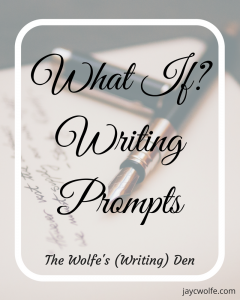 What if… global political leaders had started working to address climate change decades sooner?
What if… global political leaders had started working to address climate change decades sooner?
What if… the terrorist attacks of September 11, 2001, had never happened?
What if… America had never started the Iraq War?
What if… Europe hadn’t begun to form what would eventually become the European Union after World War II?
What if… the Founding Fathers had established America as a direct democracy instead of an electoral college?
Enjoy writing more stories about history!
If you have any “What If?” writing prompt suggestions (for any theme), please feel free to share them in the comments below. Ideas I like may be featured in future “What If?” posts, with full credit and a link to your blog (if you have one)! Also, if you’ve written a piece based on an idea you’ve found here, be sure to link back to the respective “What If?” post. I would love to see what you’ve done with the prompt! Thank you!
by Naomi L. | September 6, 2017 | Blog, Creative Writing, Featured |
Remember that post I shared last week about the hard truths of being a writer? Well, fear not; I promise you that was only half of the big picture. After all, why would anyone choose to write if it only ever brought misery? Being a writer can be just as rewarding as it is frustrating, and if you can power through its challenges, you’ll find an incredibly adventurous and fulfilling path ahead.
So for those of you who choose to follow this path, here are six perks of being a fiction writer that you can look forward to. Happy writing!
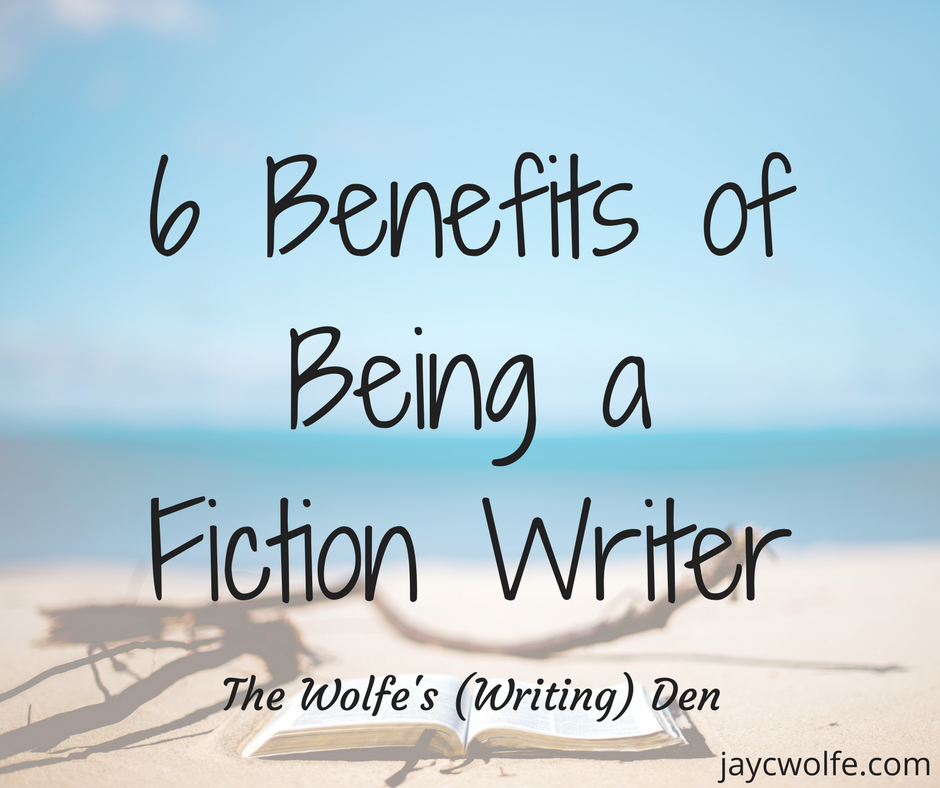
Writing Perk #1: You have the power to create anything.
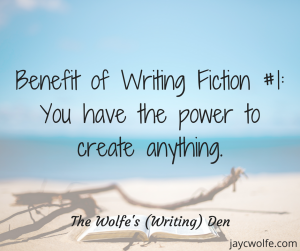 In a way, fiction writers make up their own class of superheroes. Some people have super strength, others are incredibly smart, and still others excel at almost everything they try. But writers? We have the ultimate gift: the power of creation.
In a way, fiction writers make up their own class of superheroes. Some people have super strength, others are incredibly smart, and still others excel at almost everything they try. But writers? We have the ultimate gift: the power of creation.
While I envy visual artists for their ability to draw, I’d still favor being a writer any day. The ability to paint vivid images with language is a special form of art with its own challenges, and when done right, it can be even more effective. A picture may be worth a thousand words, but imagery through words alone is an exercise for the imagination.
Anyone who’s ever tried writing a novel—especially a fantasy or science fiction novel—is familiar with the concept of “world building”. There’s much more to storytelling than conflict; you must create characters and settings to bring that conflict to life. And in my experience, there’s nothing quite as thrilling as the power to create an entire universe and direct the fates of its inhabitants any way you want. Besides, at what other job can you openly say you kill people for a living? Writing may not be the highest paying job in the world, but it certainly has benefits you can’t get anywhere else!
Writing Perk #2: You regularly exercise your mind and imagination.
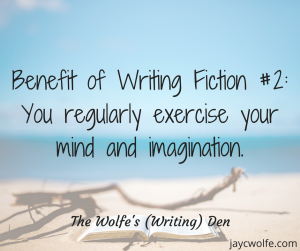 There’s nothing like writing a story to get those creative juices flowing. It’s no secret that writing has several psychological benefits such as catharsis and improved learning, and writing fiction has the added benefit of exercising the imagination. Creativity is always a useful skill, so you can never have too much of it!
There’s nothing like writing a story to get those creative juices flowing. It’s no secret that writing has several psychological benefits such as catharsis and improved learning, and writing fiction has the added benefit of exercising the imagination. Creativity is always a useful skill, so you can never have too much of it!
By regularly creating characters, settings, and plots, you exercise the ability to see situations from various perspectives and open your mind to all sorts of possibilities, as much in fiction as in real life. Practice with conflict resolution in fiction can also be surprisingly helpful when it comes to real-world problem-solving, as you’ll likely be able to foresee problems more easily and find better solutions. And if not, at least you’ll have another story to tell when everything’s said and done. Writing fiction provides plenty of benefits for your mind and spirit. Don’t let them go to waste!
Writing Perk #3: You have the best emotional release in the world.
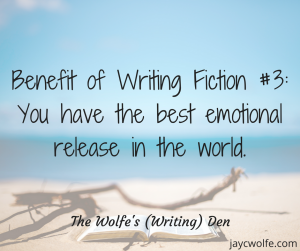 There’s a saying that goes, “Never wrong a writer. They get their revenge in print.” There’s another saying that goes, “If a writer falls in love with you, you can never die.” What do these sayings have in common? They prove that writers have the most powerful emotions in the world.
There’s a saying that goes, “Never wrong a writer. They get their revenge in print.” There’s another saying that goes, “If a writer falls in love with you, you can never die.” What do these sayings have in common? They prove that writers have the most powerful emotions in the world.
Being a writer, especially a fiction writer, takes a generous amount of vulnerability to pull off. Good fiction demands a fair share of emotion to resonate with the audience, and that means the writer must be an emotional being. We bleed our feelings onto the page and carefully craft our stories to evoke the empathy of our readers, and such an art form takes inspiration from real-life emotions. Fortunately, life provides emotional inspiration in spades.
As a writer, you should never be afraid to use your emotions in your work. When you’re happy, write motivational pieces with positive takeaways. If you fall in love, draw romantic stories or poetry from personal experience. Use a broken heart as the foundation of tragedies, and when someone infuriates you, adapt them into an expendable character and kill them off in the most satisfyingly painful way. In how many other jobs can you say your emotions are your most powerful tools? Use them to your advantage!
Writing Perk #4: You learn new things all the time.
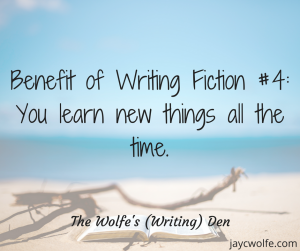 Think of the last time you wrote a story about something you’ve never done before. Chances are you had to do a fair amount of research to get it right, and you probably learned something unexpected while you did. This is one of the most enjoyable parts of writing fiction: you learn something new every day!
Think of the last time you wrote a story about something you’ve never done before. Chances are you had to do a fair amount of research to get it right, and you probably learned something unexpected while you did. This is one of the most enjoyable parts of writing fiction: you learn something new every day!
Whether you write fantasy/sci-fi novels, historical fiction, or anything in between, at some point during writing, you’ll run into a detail that you’ll have to look up. While research can be tedious sometimes, you can also see it as an opportunity to learn something you never would have otherwise. From ancient mythology to medieval weaponry to space technology, the world is full of fascinating information just waiting to be turned into stories. With all the research it takes to be a fiction writer, we probably learn more doing what we do than all the other professionals out there combined!
Writing Perk #5: You get rewarded for being yourself.
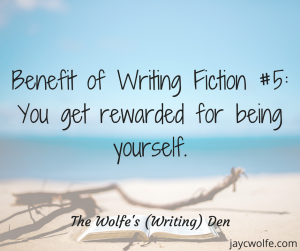 Let’s be honest: the absolute best writing always comes from the heart, and the only way to write from the heart is to be yourself. Hiding behind a mask of civility may get you ahead in the corporate world, but when it comes to writing fiction, imperfection is your greatest asset. No matter what genre you write in, it’s your original voice that will make it unique. You don’t have to be completely crazy (though eccentricity is definitely a plus); you just have to be relatable. And if you’re flawed—or in other words, human—you’ve already got that covered.
Let’s be honest: the absolute best writing always comes from the heart, and the only way to write from the heart is to be yourself. Hiding behind a mask of civility may get you ahead in the corporate world, but when it comes to writing fiction, imperfection is your greatest asset. No matter what genre you write in, it’s your original voice that will make it unique. You don’t have to be completely crazy (though eccentricity is definitely a plus); you just have to be relatable. And if you’re flawed—or in other words, human—you’ve already got that covered.
One of the most famous writing tips out there is “write what you know”, so when drawing inspiration from people for characters, the best person to start with is yourself. You know your own strengths and weaknesses, so you already have what it takes to create a well-rounded character. From there, work your way up to using other real people as inspiration for characters, and before you know it, you’ll be writing dozens of stories that readers will easily relate to.
Basically, if you’re only writing perfect characters who never deal with conflict in any way, you’re doing fiction wrong. Everyone has their flaws and problems, and if you can be open about yours, you can create meaningful and inspiring works of art, just by being yourself. How is that not the greatest job in the world?
Writing Perk #6: You can make a difference in the world.
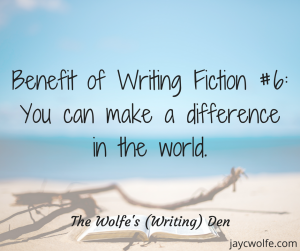 There are few forms of writing that make an impact quite the way storytelling does. While nonfiction generally focuses on logic and rational thought, stories have the power to mix truth with emotion in a unique style that appeals to a reader’s entire character, thus making for much more influential writing.
There are few forms of writing that make an impact quite the way storytelling does. While nonfiction generally focuses on logic and rational thought, stories have the power to mix truth with emotion in a unique style that appeals to a reader’s entire character, thus making for much more influential writing.
By becoming a writer, you’ve already taken a major step toward making a difference in the world. You don’t even have to change the entire world; the chance to influence even one person’s life is already worth the effort. You may not realize it yet, but you have the power to make a real difference. So share your stories and show people they’re not alone. Inspire those around you and use your words to make life better for everyone. The world could always use more stories, so keep on writing!
Can you attest to any of these perks of being a fiction writer? What other benefits of writing fiction would you add to this list?
by Naomi L. | August 30, 2017 | Blog, Creative Writing, Featured |
So you want to be a writer. Fantastic! But have you thought it through? Do you know what it really takes to be a writer? You might think you do, but if you’re only looking through rose-colored glasses at the glamour of being a famous author, you may be shocked to find some ugly bumps in the road. Writing is full of harsh reality checks, and if you’re not prepared for what lies ahead, those cold hard truths can tear you to shreds faster than you can say “unfinished manuscript”.
So before you head out on your grand writing journey, here are six hard truths about being a writer you should really be aware of. Proceed at your own discretion!
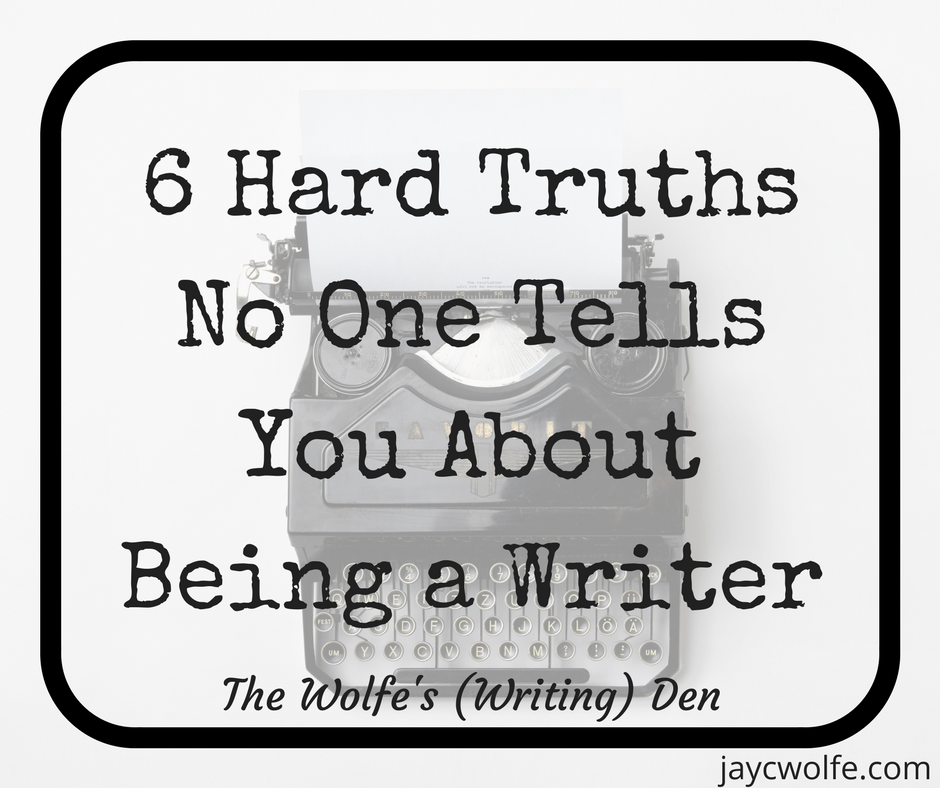
Hard Truth #1: Writing is not as easy as you think it is.
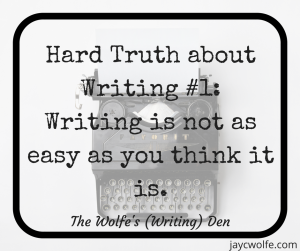 If you’re thinking about pursuing writing because it’s an easy way to make a living right off the bat, then stop right there. Turn around and go back, because this is not the calling for you. Or if you insist, proceed and find out the hard way: writing is not as easy as you think. In fact, some would go as far as to say writing is one of the hardest things in the world to do. Tons of hard work for relatively little reward? Nothing easy about that.
If you’re thinking about pursuing writing because it’s an easy way to make a living right off the bat, then stop right there. Turn around and go back, because this is not the calling for you. Or if you insist, proceed and find out the hard way: writing is not as easy as you think. In fact, some would go as far as to say writing is one of the hardest things in the world to do. Tons of hard work for relatively little reward? Nothing easy about that.
Let me be clear about something: writing itself is easy. It’s hardly a skill; I mean, we learned how to do it in preschool. What’s hard is writing well. If being good at writing were easy, everyone would be making a living from it. Or maybe no one would because everyone could do it for themselves. Either way, a world where everyone’s a writer would be vastly different than the world of “aspiring artists” we know today.
Everyone starts somewhere, and more often than not, “somewhere” is not very good. What separates the wannabes and amateurs from the serious writers is a commitment to mastering the craft. The amateurs will give up at the first sign of adversity: a lack of inspiration, difficulty editing, a polite yet stern rejection letter. The serious writers, on the other hand, will tackle those challenges and use them as motivation to improve. You can’t appreciate inspiration until you’ve faced hours of writer’s block, you can’t know how to self-edit until you’ve practiced enough times to learn what works, and you can’t find publishing success unless you keep pitching your work to people who might give you a chance.
If you go into the world of writing thinking it’ll be easy, then you’d better brace yourself for a lot of slaps in the face. The writing journey is a marathon, not a sprint. Approach it with respect, and you’ll find that while it may not get much easier over time, it will be much more rewarding in the end.
Hard Truth #2: Writing is not for everyone.
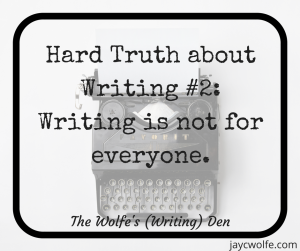 After dispelling the first myth about writing being easy, you may still want to pursue it for the sheer love of the craft. There’s nothing wrong with that; after all, a journey to becoming a writer should start with passion. But there’s more to being a writer than just writing.
After dispelling the first myth about writing being easy, you may still want to pursue it for the sheer love of the craft. There’s nothing wrong with that; after all, a journey to becoming a writer should start with passion. But there’s more to being a writer than just writing.
You might think that you don’t need to worry about editing or publishing or marketing because those jobs can all be handed off to someone else. Editing is what editors are paid for. Publishing and marketing can be handled by big publishing houses. All you have to do is write, and others will take care of the rest.
Yet in today’s world, where everyone is screaming over each other for attention, writers must be so much more. Writers must also be editors and marketers and, in the case of “indies”, even publishers. You will have to edit your own manuscript before you send it to a professional editor, and again after you get it back (expect to repeat this process several times). You will either have to convince an agent or a publisher to sell your book or make the decision to publish it yourself. You will have to do much of the marketing for your own book, regardless of which publishing route you take. And you will have to accept feedback when people actually read it, both good and bad.
So if you’re not prepared to put in all the hard work, to endure long periods of writer’s block and loneliness, edit and re-edit, power through rejections or self-publishing, and deal with criticism from readers, you might as well stop right here, because you clearly don’t have what it takes to be a writer. Well, not a published one, anyway.
This doesn’t mean you should give up writing forever; just maybe keep practicing in private until you can fully commit to becoming an author. When you’re ready to share your stories with the world, the world will be ready to read them. Until then, writing (publicly) is probably not for you.
Hard Truth #3: Inspiration doesn’t strike whenever you want it to.
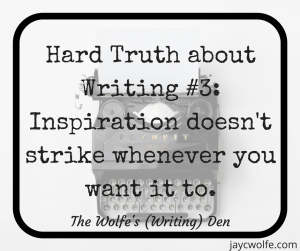 We all like to imagine artists as eccentric people in constant connection with the muses. Beauty is in everything, and even the most mundane details can be turned into a work of art in the mind of a creative person. Inspiration is anywhere and everywhere; you just have to know where to find it.
We all like to imagine artists as eccentric people in constant connection with the muses. Beauty is in everything, and even the most mundane details can be turned into a work of art in the mind of a creative person. Inspiration is anywhere and everywhere; you just have to know where to find it.
If this is your vision of writing, then prepare yourself for a world of disappointment. Much like money, inspiration doesn’t just grow on trees or fall out of the sky when you least expect it; you have to work hard to get it. The muses can be generous, but they’re also elusive. Sure, there will be plenty of times when inspiration strikes without warning, but most of the time, you will have to look for it yourself.
One of the hardest lessons you’ll learn about writing is that if you sit around waiting to write only when inspiration strikes you, you’ll never get any writing done. Many people assume that you have to get inspired to write, but believe it or not, it’s almost always the other way around: you have to write to get inspired.
Make time to create, even when you don’t feel like it. Put pen to paper or fingers to keys and start spilling words onto the page. If you don’t know where to start, use writing prompts, try writing exercises, or scribble random ideas in your notebook until something sticks. Just don’t be idle. Admit this to yourself once and for all: waiting for inspiration is nothing but a lame excuse to procrastinate. Stop waiting to be creative and just write already!
Hard Truth #4: Thick skin only comes with experience.
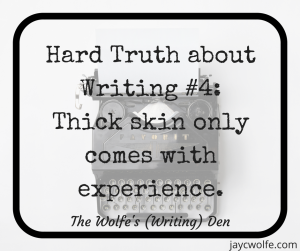 Picture this: You’ve finally published that novel you’ve been working on for years. You’ve done everything you could to make it perfect; now you sit back and wait for the praise to start rolling in. And for a while, it does: first from friends and family, then from total strangers! Everyone is liking your book! You’re a success! But just when you finally start to shed that crippling self-doubt…
Picture this: You’ve finally published that novel you’ve been working on for years. You’ve done everything you could to make it perfect; now you sit back and wait for the praise to start rolling in. And for a while, it does: first from friends and family, then from total strangers! Everyone is liking your book! You’re a success! But just when you finally start to shed that crippling self-doubt…
Gasp! What’s this? A bad review? Someone didn’t like your story! You’ve failed! All that doubt comes flooding back tenfold. And that’s why you’re now a tearstained mess, curled up on your bedroom floor and drowning yourself in chocolate for the third day in a row. Maybe you were never cut out for this writing stuff after all.
We see this advice in every publishing resource out there: if you want to be a writer, you have to have thick skin. But nobody tells you that thick skin isn’t something you magically get just because you wish for it. For most of us, the only way to learn how to brush off criticism is through brutal firsthand experience.
While it’s true that many people can dive headfirst into a profession without ever caring what people think, thick skin is especially hard for writers to develop because writing by nature requires vulnerability. As artists, we bear our souls on the page and show our emotions through our work, so when that work isn’t well received, we can’t help but take it personally. And why wouldn’t we? Our stories are our babies, and no one likes being told their baby is ugly!
No matter how much time you spend mentally preparing for bad reviews, your first one will probably hit you like a ton of bricks. Why? Because deep down, there’s a part of you that wants to believe it will never happen to you. Our fragile egos will us to believe that even though everyone has different tastes and opinions, somehow our work will be the exception that’s universally praised. And that kind of thinking is just as unrealistic as any fantasy story you’ve ever read.
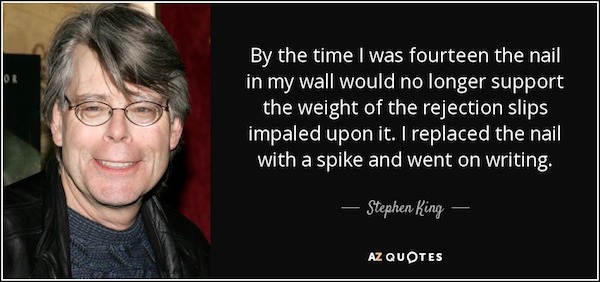
The truth is no one—and I mean literally no one—is immune to criticism. Every author gets a bad review at some point; it comes with being published. J.K. Rowling still gets one-star reviews for her critically acclaimed Harry Potter series. Stephen King, world-famous author of over two hundred stories, has too many critics to count. Margaret Atwood, Ernest Hemingway, F. Scott Fitzgerald, and Harper Lee all got scathing reviews for their classic novels when they first came out. And yet general consensus says they’re all great writers.
So don’t stress yourself out anticipating your first bad review. Instead, accept that it will come someday, tell yourself it’s okay to be upset when it does, and give yourself as much time and space as you need to move on from it. And above all, no matter how hard it seems in the moment, do not give up on writing. I promise the longer you stick with it, the easier it will get.
Hard Truth #5: Talent isn’t everything. Relationships are.
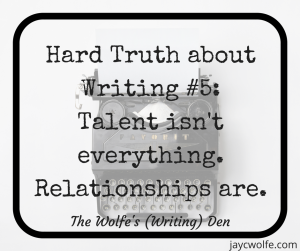 Have you ever read a well-known piece of writing—a novel, a short story, a poem—that was truly awful? Chances are you thought you could do way better. Maybe you can. Maybe you do. And maybe someday you’ll wonder why your name doesn’t appear next to those authors on the bestseller lists. Why should you have to struggle to be noticed while these writers get to enjoy fame they don’t deserve?
Have you ever read a well-known piece of writing—a novel, a short story, a poem—that was truly awful? Chances are you thought you could do way better. Maybe you can. Maybe you do. And maybe someday you’ll wonder why your name doesn’t appear next to those authors on the bestseller lists. Why should you have to struggle to be noticed while these writers get to enjoy fame they don’t deserve?
Because talent isn’t everything. That’s right, even in the world of art. Face it, even if you are extremely talented, so are thousands of other people who nobody knows or cares about. You may not be the only one reading this and thinking that your stories deserve more attention than such train wrecks as Twilight and Fifty Shades of Grey. So what makes all those terrible authors better than you? They have connections to the right people.
It takes a lot more than just being good at something to be rewarded for it. You have to know how to get your work out there, and that means building solid relationships and networks with people who can help you move forward. You need friendships with other writers who have been through the same struggles and can help you improve your writing. You need connections with editors who can polish your work and help you get it published. You need an audience of fans who will be the first to read your stories and spread the word to more potential readers.
Despite what you may think, writing is not a completely solitary endeavor. It’s more often who you know than what you know that matters. So never underestimate the power of networking, because the right person with the right connections could be the final piece of the puzzle to make your success. If you really want to be a writer, create more than stories; create meaningful, lasting relationships.
Hard Truth #6: No one chooses to write. Writing chooses you.
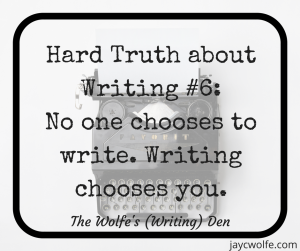 In Soviet Russia, book writes you! (You know I had to do it.)
In Soviet Russia, book writes you! (You know I had to do it.)
After learning all these hard truths about being a writer, you might be feeling a bit discouraged. Maybe you’ve changed your mind about writing and you’re already thinking about all the other skills you can put to good use instead. If that’s the case, then I’m sorry to say you were probably never meant to be a writer in the first place. But if you’ve made it to the end of this blog post and are more determined than ever to be a writer, then congratulations: writing has chosen you!
The funny thing about being a writer is that there isn’t always rhyme or reason to pursuing the craft. We write because we have to. I can’t tell you how many times I’ve looked back on old stories and blog posts I’ve written and thought, “Wow, this really sucks. Why did I write this?” And then I remember, “Oh right, because I couldn’t not write it.” This is our reality: when an idea calls, we must answer.
It’s easy enough to say you want to write your whole life, but talk is cheap. Only by doing it can you truly call yourself a writer. And if all the hard truths and fears and roadblocks of writing can’t deter you from actually sitting down and churning out those stories, then the writing life may be for you after all. So what are you waiting for? Stop reading this and get writing!
Have you learned any of these truths about writing the hard way? What other hard truths would you add to this list?
 1) She gave you the book that made you want to become a writer in the first place – In my case, that was Charlie and the Chocolate Factory, a book my mom had read as a child and recommended to me when I was nine years old. It changed my life!
1) She gave you the book that made you want to become a writer in the first place – In my case, that was Charlie and the Chocolate Factory, a book my mom had read as a child and recommended to me when I was nine years old. It changed my life!

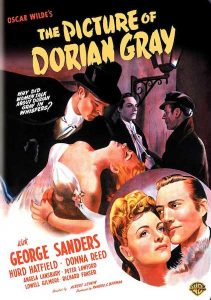


 What if… global political leaders had started working to address
What if… global political leaders had started working to address 
 In a way, fiction writers make up their own class of superheroes. Some people have super strength, others are incredibly smart, and still others excel at almost everything they try. But writers? We have the ultimate gift: the power of creation.
In a way, fiction writers make up their own class of superheroes. Some people have super strength, others are incredibly smart, and still others excel at almost everything they try. But writers? We have the ultimate gift: the power of creation. There’s nothing like writing a story to get those creative juices flowing. It’s no secret that writing has several
There’s nothing like writing a story to get those creative juices flowing. It’s no secret that writing has several  There’s a saying that goes, “Never wrong a writer. They get their revenge in print.” There’s another saying that goes, “If a writer falls in love with you, you can never die.” What do these sayings have in common? They prove that writers have the most powerful emotions in the world.
There’s a saying that goes, “Never wrong a writer. They get their revenge in print.” There’s another saying that goes, “If a writer falls in love with you, you can never die.” What do these sayings have in common? They prove that writers have the most powerful emotions in the world. Think of the last time you wrote a story about something you’ve never done before. Chances are you had to do a fair amount of research to get it right, and you probably learned something unexpected while you did. This is one of the most enjoyable parts of writing fiction: you learn something new every day!
Think of the last time you wrote a story about something you’ve never done before. Chances are you had to do a fair amount of research to get it right, and you probably learned something unexpected while you did. This is one of the most enjoyable parts of writing fiction: you learn something new every day! Let’s be honest: the absolute best writing always comes from the heart, and the only way to write from the heart is to be yourself. Hiding behind a mask of civility may get you ahead in the corporate world, but when it comes to writing fiction, imperfection is your greatest asset. No matter what genre you write in, it’s your original voice that will make it unique. You don’t have to be completely crazy (though eccentricity is definitely a plus); you just have to be relatable. And if you’re flawed—or in other words, human—you’ve already got that covered.
Let’s be honest: the absolute best writing always comes from the heart, and the only way to write from the heart is to be yourself. Hiding behind a mask of civility may get you ahead in the corporate world, but when it comes to writing fiction, imperfection is your greatest asset. No matter what genre you write in, it’s your original voice that will make it unique. You don’t have to be completely crazy (though eccentricity is definitely a plus); you just have to be relatable. And if you’re flawed—or in other words, human—you’ve already got that covered. There are few forms of writing that make an impact quite the way storytelling does. While nonfiction generally focuses on logic and rational thought, stories have the power to mix truth with emotion in a unique style that appeals to a reader’s entire character, thus making for much more influential writing.
There are few forms of writing that make an impact quite the way storytelling does. While nonfiction generally focuses on logic and rational thought, stories have the power to mix truth with emotion in a unique style that appeals to a reader’s entire character, thus making for much more influential writing.
 If you’re thinking about pursuing writing because it’s an easy way to make a living right off the bat, then stop right there. Turn around and go back, because this is not the calling for you. Or if you insist, proceed and find out the hard way: writing is not as easy as you think. In fact, some would go as far as to say writing is one of the hardest things in the world to do. Tons of hard work for relatively little reward? Nothing easy about that.
If you’re thinking about pursuing writing because it’s an easy way to make a living right off the bat, then stop right there. Turn around and go back, because this is not the calling for you. Or if you insist, proceed and find out the hard way: writing is not as easy as you think. In fact, some would go as far as to say writing is one of the hardest things in the world to do. Tons of hard work for relatively little reward? Nothing easy about that. After dispelling the first myth about writing being easy, you may still want to pursue it for the sheer love of the craft. There’s nothing wrong with that; after all, a journey to becoming a writer should start with passion. But there’s more to being a writer than just writing.
After dispelling the first myth about writing being easy, you may still want to pursue it for the sheer love of the craft. There’s nothing wrong with that; after all, a journey to becoming a writer should start with passion. But there’s more to being a writer than just writing. We all like to imagine artists as eccentric people in constant connection with the muses. Beauty is in everything, and even the most mundane details can be turned into a work of art in the mind of a creative person. Inspiration is anywhere and everywhere; you just have to know where to find it.
We all like to imagine artists as eccentric people in constant connection with the muses. Beauty is in everything, and even the most mundane details can be turned into a work of art in the mind of a creative person. Inspiration is anywhere and everywhere; you just have to know where to find it. Picture this: You’ve finally published that novel you’ve been working on for years. You’ve done everything you could to make it perfect; now you sit back and wait for the praise to start rolling in. And for a while, it does: first from friends and family, then from total strangers! Everyone is liking your book! You’re a success! But just when you finally start to shed that crippling self-doubt…
Picture this: You’ve finally published that novel you’ve been working on for years. You’ve done everything you could to make it perfect; now you sit back and wait for the praise to start rolling in. And for a while, it does: first from friends and family, then from total strangers! Everyone is liking your book! You’re a success! But just when you finally start to shed that crippling self-doubt…
 Have you ever read a well-known piece of writing—a novel, a short story, a poem—that was truly awful? Chances are you thought you could do way better. Maybe you can. Maybe you do. And maybe someday you’ll wonder why your name doesn’t appear next to those authors on the bestseller lists. Why should you have to struggle to be noticed while these writers get to enjoy fame they don’t deserve?
Have you ever read a well-known piece of writing—a novel, a short story, a poem—that was truly awful? Chances are you thought you could do way better. Maybe you can. Maybe you do. And maybe someday you’ll wonder why your name doesn’t appear next to those authors on the bestseller lists. Why should you have to struggle to be noticed while these writers get to enjoy fame they don’t deserve? In Soviet Russia, book writes you! (You know I had to do it.)
In Soviet Russia, book writes you! (You know I had to do it.)
Recent Comments